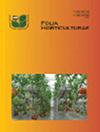Flower bud development of almond cultivars based on three different methods
IF 1.8
4区 农林科学
Q2 HORTICULTURE
引用次数: 0
Abstract
Flower bud development of fruit trees plays a key role in their climatic adaptation. It is closely related to dormancy release that determines winter frost susceptibility. Detailed characterisation of flower bud development of 25 almond (三种不同方法对杏仁品种花芽发育的影响
果树的花芽发育在果树的气候适应中起着关键作用。冬眠释放与冬季霜冻易感性密切相关。通过3年的小孢子发生和雌蕊生长研究,对25份不同花期的杏仁(Prunus amygdalus L. Batsch)材料的花芽发育进行了详细的表征。小孢子发生过程可分为6个发育阶段,雌蕊发育可分为4个发育阶段。不同品种的小孢子发育阶段和年效应在长度和数量上存在显著差异。根据小孢子发生阶段的长短,品种可分为五大类群。原始孢子和小孢子发生周期最短的是‘Eriane’、‘5/15’和‘1/7’,平均为20天和138天,最长的是‘Constanti’和‘Vairo’,分别为65天和160天。休眠期间雌蕊长度的增长处于停滞状态,休眠解除后,雌蕊长度的增长先缓慢加速,然后在开花前几天快速增长。为了确定内胚期释放的日期,对小孢子发生、雌蕊长度和芽力三种方法进行了分析。所有方法均显示不同品种间存在显著差异。在三种方法中,由小孢子发生研究估计的休眠释放的变异性最大。
本文章由计算机程序翻译,如有差异,请以英文原文为准。
求助全文
约1分钟内获得全文
求助全文
来源期刊

Folia Horticulturae
Agricultural and Biological Sciences-Horticulture
CiteScore
3.40
自引率
0.00%
发文量
13
审稿时长
16 weeks
期刊介绍:
Folia Horticulturae is an international, scientific journal published in English. It covers a broad research spectrum of aspects related to horticultural science that are of interest to a wide scientific community and have an impact on progress in both basic and applied research carried out with the use of horticultural crops and their products. The journal’s aim is to disseminate recent findings and serve as a forum for presenting views as well as for discussing important problems and prospects of modern horticulture, particularly in relation to sustainable production of high yield and quality of horticultural products, including their impact on human health.
 求助内容:
求助内容: 应助结果提醒方式:
应助结果提醒方式:


